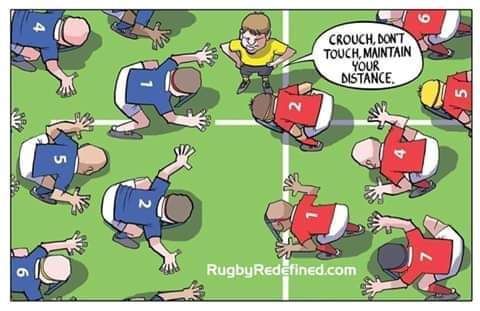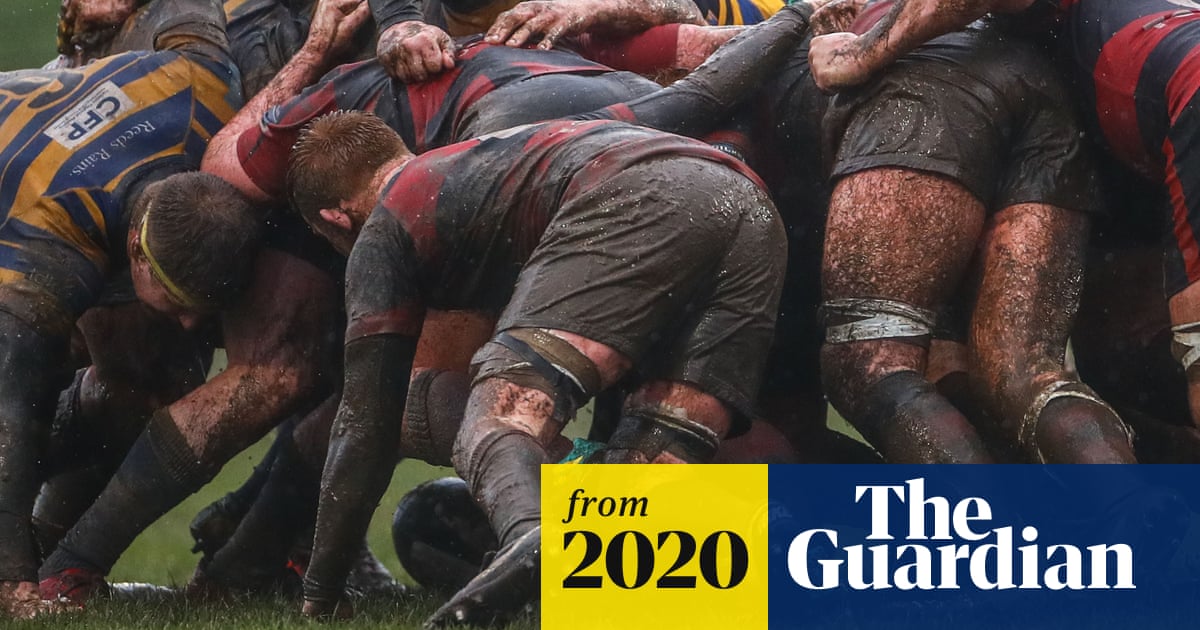Law trials and changes
-
@mariner4life said in Law trials and changes:
@antipodean said in Law trials and changes:
@mariner4life said in Law trials and changes:
i like a lot of those tweaks though
I only like the last.
I certainly don't like the idea of a team that can't scrum getting to opt out of the contest and play league.
nah, fuck it. Scrums are meant to be a way to restart play. We've gone too far now, and it's become this blight on the game where it's all gamesmanship up front and trying to con the ref.
restart play with a contest for possession
I also hate scrum after scrum on a goal line that always ends up with a prop binned. It's shit to watch.
Which is why people shouldn't be binned because their opponent is better. Keep a straight back and if your scrum gets rissoled, bad luck. If you want to fuck around, get binned.
-
@antipodean said in Law trials and changes:
@mariner4life said in Law trials and changes:
@antipodean said in Law trials and changes:
@mariner4life said in Law trials and changes:
i like a lot of those tweaks though
I only like the last.
I certainly don't like the idea of a team that can't scrum getting to opt out of the contest and play league.
nah, fuck it. Scrums are meant to be a way to restart play. We've gone too far now, and it's become this blight on the game where it's all gamesmanship up front and trying to con the ref.
restart play with a contest for possession
I also hate scrum after scrum on a goal line that always ends up with a prop binned. It's shit to watch.
Which is why people shouldn't be binned because their opponent is better. Keep a straight back and if your scrum gets rissoled, bad luck. If you want to fuck around, get binned.
i disagree with everything you wrote here.
-

-
WR please phone Dana White ffs
-
@mariner4life said in Law trials and changes:
@antipodean said in Law trials and changes:
@mariner4life said in Law trials and changes:
i like a lot of those tweaks though
I only like the last.
I certainly don't like the idea of a team that can't scrum getting to opt out of the contest and play league.
nah, fuck it. Scrums are meant to be a way to restart play. We've gone too far now, and it's become this blight on the game where it's all gamesmanship up front and trying to con the ref.
I also hate scrum after scrum on a goal line that always ends up with a prop binned. It's shit to watch.
I'm good with ending multiple resets. But after a single collapse, #1 looks like a free and easy option for the ref who doesn't really know whats going on in there, to simply say "collapse, no fault, free kick".
And I'm baffled by any support of removing the scrum as an attacking option when you win a penalty close in, surely that's an entrenched and quality part of the game?
-
@nzzp relax. It's an article about getting community rugby started in a Covid-safe way. It's not banning scrums. It's doing away with resets for a while. And stand up tackles.
It's a bit silly really. If you can play rugby, you can play with everything, but if one thing is high risk, surely the whole game is high risk.
-
@mariner4life it's the Fern, pal, I didn't read the article, just the title. FFS.
also didn't realise it was Covid response as it was in law changes/trials. Maybe better suited to Covid response internationally?
-
@nzzp said in Law trials and changes:
@mariner4life it's the Fern, pal, I didn't read the article, just the title. FFS.
also didn't realise it was Covid response as it was in law changes/trials. Maybe better suited to Covid response internationally?
clssic Fern
don't read the article, but fire up
then say the thread is in the wrong place and suggest a move.
both sides of this place in one post
-
@mariner4life yep, I'm embedded now. It's a real worry.
Back to the article though, that I felt shamed enough to skim over, it's about the restart in a Covid world. I can't see it -if you are going to have rucks and mauls, why not scrums? Seems a weird kind of thing to try and ban, and can't see it making a consequential difference at all to the risk of getting covid while playing a contact sport.
-
It's classic pandering to assuage the concerns of the hysterical and ignorant. It's either safe to have 31 people occupy the space of a field for 80mins or it's not.
-
Developed to make the breakdown safer, fairer and simpler to understand, the new guideline debuted during Super Rugby Aotearoa and Super Rugby AU. Here’s how it has impacted the game so far.
Implemented in March 2020, the new breakdown law application guideline recently made its world debut in Super Rugby Aotearoa, closely followed by its Australian introduction in Super Rugby AU.
Developed by a specialist breakdown working group consisting of the global game’s leading players, coaches and referees, including Joe Schmidt, Richie Gray, Ian Foster, Victor Vito and Wayne Barnes, Jaco Peyper and Dr Eanna Flavey the guideline is a strict reinforcement of existing law designed to promote a safer, fairer contest at the breakdown that is easier to referee and enables faster, attacking rugby.
With Super Rugby Aotearoa wrapped up and rugby’s restart in neighbouring Australia now well underway, World Rugby has analysed the matches played so far across both competitions to find out if the new guideline has delivered on its goals.
SUPER RUGBY AOTEAROA ENJOYS FASTER BALL
In New Zealand, teams and spectators enjoyed an increase in ruck speed, with average quick ball in the opposition half reducing to 2.76 seconds from 3.1 seconds in the previous season. This is significant because the evidence indicates that shorter breakdowns lead to fewer injuries.
The competition's combined penalty kick and free kick count dropped by nine – from 31 to 22 – across nine rounds of Super Rugby Aotearoa. Consistent with the data from Australia, penalties at the breakdown also reduced from rounds one to nine of the tournament, from 20 to 13.
The drop in penalty count over time across both competitions shows a clear change in behaviour and an acceptance and understanding of the new breakdown law application guideline from players, coaches and referees.
The new guideline has also had a clear impact on the split of ruck penalties between attack and defence in New Zealand. The past average shows that attacking teams are penalised less at the breakdown, claiming 44 per cent of the total. Yet, across nine rounds of Super Rugby Aotearoa this figure has risen to 51 per cent – evidence of a more equal competition at the breakdown.
BALL IN PLAY FOR LONGER IN SUPER RUGBY AU
In the opening six rounds of Super Rugby AU, the ball was in play for an average of 36 minutes 15 seconds – three minutes 42 seconds longer than the average time clocked by Australian Super Rugby teams in the previous season.
This increase in ball in play enabled an average of 40 more passes per game than previously recorded, showing an increase in free-flowing, attacking rugby.
Super Rugby AU has also recorded a clear change in how the game is being played at the breakdown. From rounds one to six, the number of penalties blown at the breakdown decreased from 13 to nine, with fewer penalties called for holding on than recorded in the previous season.
‘FANTASTIC FOR THE GAME’
After its restart on 15 August, England’s Premiership Rugby is also now applying the new breakdown law application guideline. English referee and member of the specialist breakdown working group, Wayne Barnes, spoke on BT Sport to give his reaction to the introduction of the guideline and to share some insights from its development:
“This is the top coaches, the top players in the world saying, as part of a working group, this is how we can make the game safer, this is how we can make the game fairer, and this is how we can make it more understandable.
“This (the new guideline) was all about improving player safety. Players were bent over and their necks were exposed and they were just bracing until players arrived to clear them out. What we’re saying is we want them lifted, we want them higher, and we want players who arrive cleaning them out safely, driving them backwards. We want that ball in play. We want to encourage continuity.
“We’re seeing the players adapting, we’re seeing coaches adapting. They’re buying into what we’ve been asked to do. That’s fantastic for the game.”
In the time since the new guideline was announced, World Rugby has been working with referees, teams and unions to ensure full alignment and understanding of it.
World Rugby has also published comprehensive step-by-step guidance on the application of the new guideline, featuring detailed explanations and video examples.
Rugby World Cup 2011 final referee, Craig Joubert, has been educating emerging nations’ high performance staff and union referee managers and referees on the breakdown law application guideline via the newly-launched World Rugby Virtual High Performance Academy.
Read more: World Rugby issues breakdown law application guideline >>
-
@booboo I don't like it. Not sure it adds much to the game - and will completely change the risk/reward of grubbers into the in goal.
I hate the captain's review. Refs are refs, they are gods walking amongst the players, and TMO can't even figure out forward passes

